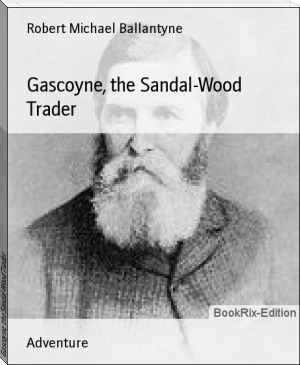Ungava by Robert Michael Ballantyne (new reading TXT) 📖

- Author: Robert Michael Ballantyne
Book online «Ungava by Robert Michael Ballantyne (new reading TXT) 📖». Author Robert Michael Ballantyne
The axes of the wood-cutters resounded among the gullies and ravines of Ungava, and awakened the numerous echoes of the mountains. The encampment no longer presented a green spot, watered by a tiny rill, but was strewn with logs in all stages of formation, and chips innumerable. The frameworks of the dwelling-houses began to rise from the earth, presenting, in their unfinished condition, a bristling, uncomfortable appearance, suggesting thoughts in the beholder's mind highly disparaging to art, and deeply sympathetic with outraged nature. The tents still stood, and the campfire burned, but the superior proportions of the rising fort threw these entirely into the shade. A rude wharf of unbarked logs ran from the beach into the river. It had been begun and finished in a couple of days, for the convenience of Gaspard while visiting his nets, as he sometimes did before the water left them. Everything, in short, bore evidence of the most bustling activity and persevering energy; and in a few weeks from the time of their first landing, the dwelling-houses were sufficiently weather-tight to be habitable, and the other portions of the establishment in an advanced condition.
The openings between the logs of the houses were caulked with a mixture of mud and moss, and left in that condition in the meantime, until the pit-saw could be set to work to produce boards for the better protection of the walls without and within. The window and door frames were also made, and covered temporarily with parchment, until the arrival of the ship should enable them to fill the former with glass and the latter with broad panels.
The effect of the parchment-covered door, however, was found to be somewhat troublesome. Being large, and tightly covered, it sounded, when shut violently, with a noise so strongly resembling the report of a distant cannon that, during the first day after its erection, the men more than once rushed down to the beach in the expectation of seeing the long and ardently wished-for ship, which was now so much beyond the time appointed for her arrival that Stanley began to entertain serious apprehensions for her safety. This ship was to have sailed from York Fort, the principal depot of the fur-traders in Hudson's Bay, with supplies and goods for trade with the Esquimaux during the year. She was expected at Ungava in August, and it was now September. The frost was beginning, even at this early period, to remind the expedition of the long winter that was at hand, and in the course of a very few weeks Hudson's Straits would be impassable; so that the anxiety of the traders was natural.
Just before the partitions of the chief dwelling-house were completed, Stanley went to the tent in which his wife and child were busily employed in sewing.
"Can you spare Edith for a short time, wife?" said he, as his partner looked up to welcome him.
"Yes, for a short time; but she is becoming so useful to me that I cannot afford to spare her long."
"I'm afraid," said Stanley, as he took his child by the hand and led her away, "that I must begin to put in my claim to the services of this little baggage, who seems to be so useful. What say you, Eda; will you allow me to train you to shoot, and fish, and walk on snow-shoes, and so make a trader of you?"
"I would like very much, papa, to learn to walk on snowshoes, but I think the gun would hurt me--it seems to kick so. Don't you think I am too little to shoot a gun off?"
Stanley laughed at the serious way in which the child received the proposal.
"Well, then, we won't teach you to shoot yet, Eda; but, as you say, the snow-shoe walking is worth learning, for if you cannot walk on the long shoes when the snow falls, I fear you'll not be able to leave the fort at all."
"Yes, and Francois has promised to make me a pair," said Edith gaily, "and to teach me how to use them; and mamma says I am old enough to learn now. Is it not kind of Francois? He is always very good to me."
"Indeed it is very kind of him, my pet; but all the men seem to be very good to you--are they not?"
"Oh yes!--all of them. Even Gaspard is kind now. He never whips Chimo, and he patted me on the head the other day when I met him alone in the ravine--the berry ravine, you know, where I go to gather berries. I wonder if there are berries in all the other ravines?--but I don't care much, for there are thousands and thousands of all kinds in my own ravine, and--where are you going, papa?"
This abrupt question was caused by her father turning into the square of the new fort, in which the most of the men were at work.
"I'm going to show you our house, Eda, and to ask you to fix on the corner you like best for your own room. The partitions are going to be put up, so we must fix at once."
As he spoke they passed through the open doorway of the new dwelling, which was a long, low building; and, placing his little daughter in the centre of the principal hall, Stanley directed her to look round and choose a corner for herself.
For a few minutes Edith stood with an expression of perplexity on her bright face; then she began to examine the views from each of the corner windows. This could only be done by peeping through the bullet-hole in the parchment skins that in the meantime did duty for glass. The two windows at the back corners looked out upon the rocky platform, behind which the mountains rose like a wall, so they were rejected; but Edith lingered at one of them, for from it she saw the spring at the foot of the rock, with its soft bed of green moss and surrounding willow-bushes. From the front corner on the left hand Cross Island and the valley of the river beyond were visible; but from the window on the right the view embraced the whole sweep of the wide river and the narrow outlet to the bay, which, with its frowning precipices on either side, and its bold flanking mountains, seemed a magnificent portal to the Arctic Sea.
"I think this is the nicest corner," said Edith, turning with a smile to her father.
"Then this shall be yours," said Stanley.
"But," exclaimed Edith, as a sudden thought occurred to her, "perhaps Frank would like this corner. I would not like to have it if Frank wants it."
"Frank doesn't want it, and Frank shan't have it. There now, run to your mother, you little baggage; she can't get on without you. Off you go, quick!"
With a merry laugh Edith bounded through the doorway, and disappeared like a sunbeam from the room.
On the 25th of September, Stanley was standing on the beach, opposite the fort, watching with a smile of satisfaction the fair, happy face of his daughter, as she amused herself and Chimo by throwing a stick into the water, which the latter dutifully brought out and laid at her feet as often as it was thrown in. Frank was also watching them.
"What shall we call the fort, Frank?" said his companion. "We have a Fort Good Hope, and a Fort Resolution, and a Fort Enterprise already. It seems as if all the vigorous and hearty words in the English language were used up in naming the forts of the Hudson's Bay Company. What shall we call it?"
"Chimo! Chimo! Chimo!" shouted Edith to the dog, as the animal bounded along the beach.
Both gentlemen seemed to be struck with the same idea simultaneously.
"There's an answer to your question," said Frank; "call the fort `Chimo.'"
"The very thing!" replied Stanley; "I wonder it did not occur to me before. Nothing could be more appropriate. I salute thee, Fort Chimo," and Stanley lifted his cap to the establishment.
In order that the peculiar appropriateness of the name may appear to the reader, it may be as well to explain that Chimo (the _i_ and _o_ of which are sounded long) is an Esquimau word of salutation, and is used by the natives when they meet with strangers. It signifies, _Are you friendly_? by those who speak first, and seems to imply, _We are friendly_, when returned as an answer. So well known is the word to the fur-traders who traffic with the natives of Hudson's Straits that they frequently apply it to them as a name, and speak of the Esquimaux as Chimos. It was, therefore, a peculiarly appropriate name for a fort which was established on the confines of these icy regions, for the double purpose of entering into friendly traffic with the Esquimaux, and of bringing about friendly relations between them and their old enemies, the Muskigon Indians of East Main.
After playing for some time beside the low wharf, Edith and her dog left the beach together, and rambled towards a distant eminence, whence could be obtained a commanding bird's-eye view of the new fort. She had not sat many minutes here when her eye was arrested by the appearance of an unusual object in the distance. Frank, who was yet engaged in conversation with Stanley on the beach, also noticed it. Laying his hand on the arm of his companion, he pointed towards the narrows, where a small, white, triangular object was visible against the dark cliff. As they gazed, a second object of similar form came into view; then a fore and top sail made their appearance; and, in another second, a schooner floated slowly through the opening! Ere the spectators of this silent apparition could give utterance to their joy, a puff of white smoke sprang from the vessel's bow, and a cannon-shot burst upon the mountains. Leaping on from cliff to crag, it awakened a crash of magnificent echoes, which, after prolonged repetitions, died away in low mutterings like distant thunder. It was followed by a loud cheer from
 Nowadays a big variety of genres are exist. In our electronic library you can choose any book that suits your mood, request and purpose. This website is full of free ebooks. Reading online is very popular and become mainstream. This website can provoke you to be smarter than anyone. You can read between work breaks, in public transport, in cafes over a cup of coffee and cheesecake.
Nowadays a big variety of genres are exist. In our electronic library you can choose any book that suits your mood, request and purpose. This website is full of free ebooks. Reading online is very popular and become mainstream. This website can provoke you to be smarter than anyone. You can read between work breaks, in public transport, in cafes over a cup of coffee and cheesecake.




Comments (0)